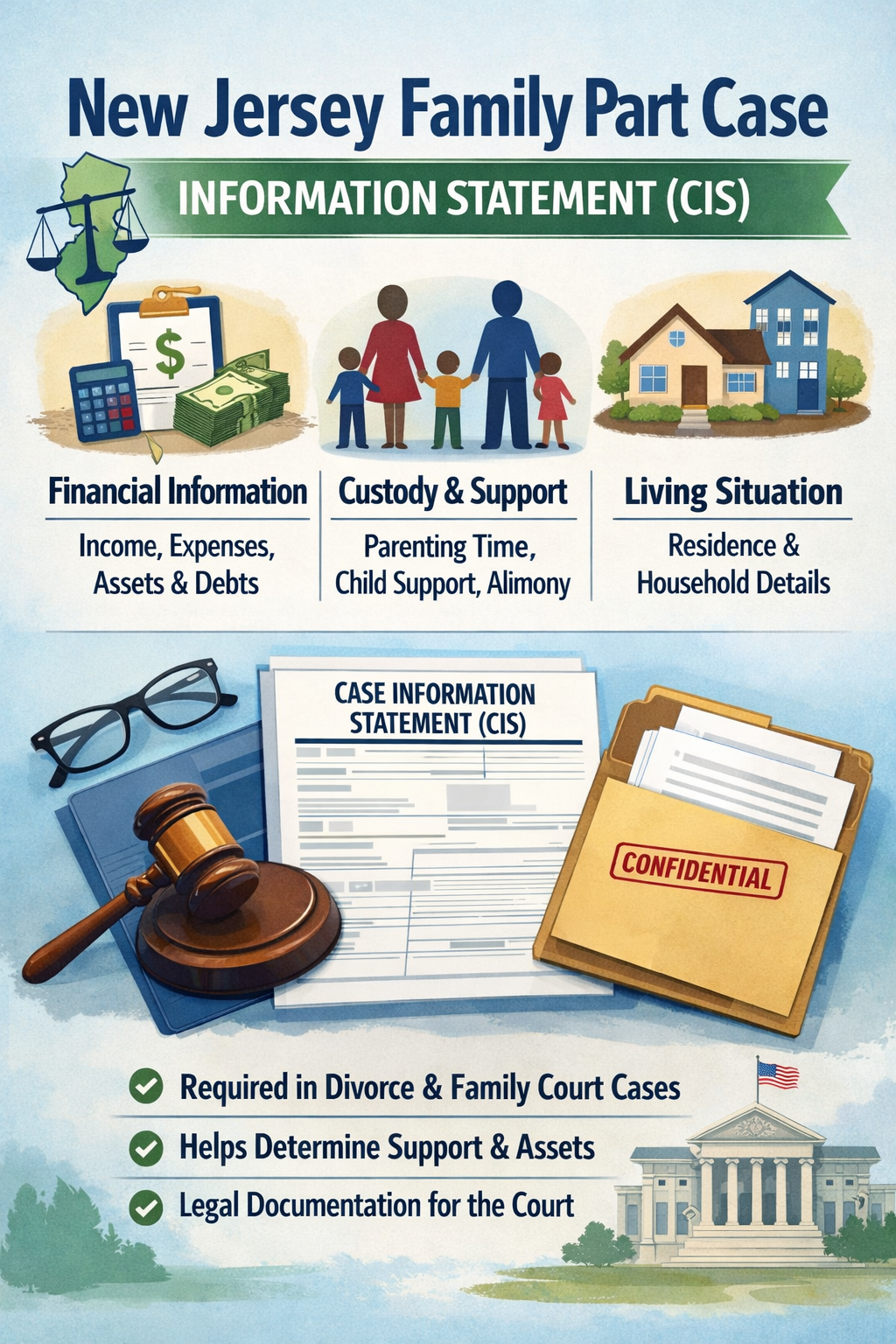How Do the Courts Determine Amount & Duration of Alimony Payments
June 2, 2022
Going through a divorce remains a traumatic experience for both parties. Hurt feelings, court proceedings, and arguing with your spouse may cause a contentious situation. One area that stirs up these feelings and conflict is the subject of alimony payments. Who pays who, how much they have to pay, and for how long turns this into one of the most hotly contested issues in the divorce process.
It falls upon the courts to determine these finer details, but both parties have an important question: How do the courts determine alimony payments? It is a complex and nuanced answer that changes on a case-by-case basis, but there are certain factors that courts consider when choosing alimony payments, which will be discussed below.
The Different Types of Alimony
Divorce attorneys will let their clients know about the different types of alimony that can be awarded in the state of New Jersey. Among the different types of available spousal support
include:
- Pendente Lite (pending the litigation of the divorce)
- Limited duration
- Rehabilitative
- Reimbursement
- Open-durational
Each type of Alimony has diff erent requirements, durations, and other factors that determine how law firms and courts determine alimony payments.
Factors to Determine Alimony in New Jersey?
While any party involved in a divorce can be awarded alimony, the courts will grant it to those who meet certain factors. Among these factors that the courts take into account include:
- The actual need and ability of the parties to pay.
- The duration of the marriage.
- The parties’ age, physical and emotional health.
- The standard of living established in the marriage. This includes the likelihood that each party can maintain a reasonably comparable standard of living.
- The earning capacities, educational levels, vocational skills, and employability of the parties.
- The length of absence from the job market of the party seeking maintenance.
- The parental responsibilities for the children.
- The time and expense necessary to acquire sufficient education or training to enable the party seeking maintenance to find appropriate employment. This creates the opportunity for future acquisitions of capital assets and income.
- The history of the financial or non-financial contributions to the marriage by each party. Contributions include the care and education of the children and interruption of personal careers or educational opportunities.
- The equitable distribution of property and any payouts on equitable distribution, directly or indirectly, out of current income, to the extent this consideration is reasonable, just and fair.
- The income available to either party through investment of any assets held by that party.
- The tax treatment and consequences to both of any alimony award including the designation of all or a portion of the payment as a non-taxable payment.
- The nature, amount, and length of pendente lite support paid.
- Any other factors which the court may deem relevant.
Gross Incomes of Both Spouses
New Jersey currently does not have an official formula for determining how much alimony is awarded during a divorce as opposed to the Child Support Guidelines in determining child support. However, most divorce lawyers in Burlington County, NJ, will utilize gross incomes of both spouses, calculate the difference, and then award the payee spouse around a quarter of the difference in the incomes. You also want to ensure that payments are payable through probation for enforcement purposes.
Determining the Duration of the Payments
When it comes to figuring out how long one spouse has to pay alimony, a few determining factors are considered. Throughout the duration of the divorce proceedings, the judge may award a pendente lite alimony that ends once the divorce is finalized and a more definitive alimony structure is reached. Our firm can help you determine how long your alimony payments should last — whether receiving or paying — and help ensure that it meets your needs and budget.
In New Jersey, if the spouse receiving alimony enters a civil union or gets remarried, the alimony shall be terminated effective the day of the remarriage. If you do not notify the other party of the remarriage immediately, you risk paying attorney fees and court costs to the paying spouse. Alimony also terminates upon the death of either party.
Can Alimony Payments Be Modified at a Later Date?
Life happens, circumstances change, and the unpredictability of everyday life can drastically affect a person’s ability to provide. Making changes to alimony payments is not unheard of, but they require specific language into your Agreement. Temporary unemployment is not a reason for the Court to grant a change in alimony. However, disability, normal retirement age or a substantial change in income, may be reasons to terminate and/or modify the alimony award.
If you believe you are entitled to a modification, you should first attempt to resolve the issue with your ex, by and between counsel. If that is unsuccessful, you may file a Motion with the Court requesting the relief sought. You will need to show that circumstances significantly changed
since the original ruling or agreement between the parties.
Securing Alimony with Life Insurance
When alimony is agreed upon or court ordered, the paying spouse shall maintain a life insurance policy securing the duration and amount of the alimony. The policy should name the payee as beneficiary of that policy and the payor shall provide proof of life insurance on an annual basis. If it is for a limited duration, the paying spouse shall be entitled to reduce the policy each year.
Turn to Berg & Pearson, P.C. for Help With Your Upcoming Divorce
When it comes time to go through your divorce, you want a law firm on your side that keeps your best interests at heart and will fight for you. Whether you have to make alimony payments or entitled to receive alimony payments, our divorce attorneys in Mount Laurel, NJ, are ready to help! Contact our office for a free
consultation by phone or Zoom and learn how we can help!

The New Jersey Judiciary implemented significant revisions to the Case Information Statement (CIS), the financial disclosure document required in divorce and other Family Part matters involving support and equitable distribution. These updates modernize the form, expand required disclosures, and reinforce the importance of transparency in family court proceedings. For parties involved in divorce or post-judgment applications, compliance with the revised CIS is critical. Courts rely heavily on this document when determining child support, alimony, equitable distribution, and counsel fees. The CIS is a sworn statement of a party’s financial circumstances and is required in matters involving: • Child support • Alimony • Equitable distribution of marital assets and debts • Counsel fee applications • Post-judgment motions seeking modification of financial obligations Key Updates to the CIS 1. New Schedule for Seasonal and Occasional Expenses The revised CIS separates seasonal and non-monthly expenses from standard monthly household costs. This change is intended to provide courts with a clearer understanding of true annual expenses. Examples include snow removal, lawn or landscaping services, vehicle registration and inspection fees, and other recurring but non-monthly costs. 2. Expanded Asset Disclosure The updated CIS requires disclosure of additional asset categories that reflect modern financial realities, including: • Cryptocurrency and other digital assets • Children’s financial accounts, such as custodial savings or 529 plans • Prepaid taxes, tax refunds, and tax credits • Income tax carryover losses • Any assets not otherwise specifically identified on the form 3. Expanded Liability Categories Parties must now expressly disclose: • Tax liabilities, including unpaid federal or state obligations • Any other liabilities not previously itemized on the CIS This change helps courts assess net worth more accurately when allocating marital debt. 4. Dedicated Line Item for Streaming and Digital Subscriptions Recognizing the prevalence of subscription-based household expenses, the revised CIS includes a specific line item for streaming services and digital subscriptions. This promotes consistent reporting of expenses that were previously scattered across miscellaneous categories. Conclusion The revised New Jersey Case Information Statement represents a meaningful modernization of financial disclosure requirements in family law cases. Parties involved in divorce or post-judgment matters must take care to use the updated form and provide complete, accurate information supported by documentation. Given the central role the CIS plays in determining financial outcomes, working with experienced family law counsel can help ensure compliance, protect credibility, and avoid unnecessary disputes. For guidance on preparing or updating a Case Information Statement, or for questions regarding divorce and post-judgment financial issues, consult with a qualified New Jersey family law attorney.

Why Choose Mediation Over Litigation in New Jersey? If you’re facing a divorce or family dispute in New Jersey, you may be wondering whether to pursue litigation or mediation. While both are viable legal paths, mediation often provides a more cost-effective, private, and collaborative solution. 💰 1. Mediation is More Cost-Effective Litigation involves court fees, multiple attorney appearances, and drawn-out legal battles. Mediation typically reduces costs significantly because the parties share the cost of a neutral mediator and avoid prolonged courtroom proceedings. 🔐 2. Mediation is Confidential Court cases are part of the public record. Mediation sessions are private, allowing you to resolve personal or sensitive matters discreetly. 🧭 3. You Maintain Control Over the Outcome In litigation, a judge decides the outcome. In mediation, you and the other party create your own agreement, which often results in more practical and lasting solutions. 🕊️ 4. Mediation is Less Stressful and More Cooperative Mediation focuses on problem-solving rather than blame, reducing conflict and making the process more amicable—especially important when co-parenting is involved. 👶 5. It’s Better for Children New Jersey courts often favor mediation for custody and parenting time because it promotes cooperative parenting and helps maintain stable routines for children. 🕒 6. More Flexible Scheduling You’re not bound by a court’s calendar. Sessions can be scheduled around your availability, speeding up the process. 🤝 7. It Preserves Relationships Whether it’s your co-parent, a sibling, or a business partner, mediation helps maintain respectful communication for future interaction. Conclusion: New Jersey courts encourage mediation for good reason. It’s faster, less expensive, and often leads to more satisfactory outcomes than traditional litigation. If you're navigating a family law matter, consider speaking with a qualified mediator to see if it’s right for you. Need Help with Mediation in New Jersey? Contact our office today to learn more about how we can help!

Donald Trump indicated that Tom Homan, the former acting U.S. Immigration and Customs Enforcement director under Mr. Trump’s previous administration, will serve as “Border Czar” in his incoming administration. This position will likely play an important function in furtherance of Mr. Trump’s campaign pledges to secure the border and target individuals for in a massive deportation operation. Mr. Homan previously warned that, “no one’s off the table. If you’re here illegally, you better be looking over your shoulder.” He further assured. “You’ve got my word. Trump comes back in January, I’ll be in his heels coming back, and I will run the biggest deportation operation this country’s ever seen.” He further said, “It’s going to be a well-targeted, planned operation conducted by the men of ICE. The men and women of ICE do this daily. They’re good at it.” When asked whether there was a way to carry out deportations without separating families, he said, “Families can be deported together.” In today’s heightened political climate on the issue of immigration, it is highly recommended that you take all steps to assure your legal status in the United States. If you are married to a United States Citizen and living in the United States without proper credentials, you should take steps to become legal. If you are a permanent resident, now is the time to become a United States Citizen.

Essential Qualities to Look for in a Divorce Lawyer Going through a divorce can be one of the most challenging experiences in a person's life. Choosing the right divorce lawyer can make a significant difference in navigating this difficult process. Here are the most important qualities and factors to consider when selecting a divorce attorney. 1. Experience and Expertise When it comes to divorce, experience matters. Look for a lawyer who specializes in family law and has a proven track record in handling divorce cases. An experienced attorney will be familiar with local laws, court procedures, and potential pitfalls, giving you an advantage in your case. 2 . Strong Communication Skills A good divorce lawyer should communicate clearly and effectively. They should be able to explain complex legal concepts in a way you can understand and keep you informed about the progress of your case. Look for someone who listens to your concerns and responds promptly to your questions. 3. Empathy and Understanding Divorce can be emotionally draining. An empathetic lawyer can provide not only legal support but also emotional understanding. Look for someone who demonstrates compassion and is sensitive to the stress you’re experiencing, as this can make the process more manageable. 4. Strategic Thinking Divorce cases often require strategic planning. A competent lawyer should be able to assess your situation, identify the best course of action, and anticipate potential challenges. They should work with you to develop a tailored strategy that aligns with your goals. 5. Negotiation Skills Many divorce cases are settled outside of court through negotiation. A skilled negotiator can help you reach a fair settlement that meets your needs. Look for a lawyer who has strong negotiation skills and is willing to advocate fiercely on your behalf while remaining open to compromise when appropriate. 6. Reputation and Reviews Researching a lawyer’s reputation can provide valuable insight. Look for online reviews, testimonials, and ratings from past clients. You can also ask for recommendations from friends or family who have gone through a similar experience. A lawyer with a positive reputation in the community is more likely to be reliable and effective. 7. Transparent Fees and Billing Understanding the costs associated with hiring a divorce lawyer is crucial. Look for someone who is transparent about their fees and billing practices. Ask about their hourly rates, retainer fees, and any additional costs you might incur. A good lawyer will provide a clear breakdown of what you can expect financially. 8. Compatibility and Trust You’ll be sharing personal and sensitive information with your lawyer, so it’s important to find someone you feel comfortable with. Trust your instincts when meeting potential lawyers. Choose someone whose approach resonates with you and whom you feel you can rely on throughout the process. 9. Accessibility and Support Divorce can be a lengthy process, and you want a lawyer who is accessible when you need them. Consider their availability and willingness to support you. A lawyer who makes time for their clients and prioritizes communication can help you feel more secure during this transitional period. 10. Understanding of Child Custody Issues (if applicable) If children are involved in your divorce, finding a lawyer with a strong understanding of child custody laws is essential. They should be knowledgeable about what factors the court considers in custody arrangements and how to advocate for your children’s best interests. Conclusion Choosing the right divorce lawyer can significantly impact the outcome of your case and your overall experience. By considering these essential qualities, you can find a legal advocate who aligns with your needs and helps you navigate the complexities of divorce with confidence. Take your time in the selection process and prioritize finding someone who will support you through this challenging chapter of your life. The lawyers at Berg & Pearson, P.C. are here to help!

Divorce is a deeply emotional and difficult process, and it is normal to feel overwhelmed. Here are some steps that might help you navigate the situation. 1. Give yourself space to process emotions: • Take time to process what you’re feeling. Shock, sadness, anger, and confusion are common reactions. • It can be helpful to speak with a therapist or counselor to help you sort through your emotions. 2. Communicate with your spouse: • When you’re ready, have a calm conversation with your spouse. Try to understand the reasons behind their decision. • If emotions run high, consider using a neutral space or even a mediator to facilitate the conversation. 3. Seek legal advice: Contact Michael H. Berg, Esq., or Joy A. Pearson, Esq., our lawyers who practice family law who can help you understand your rights and what to expect from the process. Getting professional guidance is important. 4. Take care of practical matters: • Consider joint assets, debts, and financial responsibilities. You might want to begin organizing important documents, like financial records, mortgages, and other assets. • If you have children, start thinking about how to approach custody, visitation, and support in a way that prioritizes their well-being. 5. Find support: • This is a challenging time, so don’t hesitate to lean on trusted friends or family for emotional support. • Divorce support groups or individual therapy can be helpful for finding a sense of community or guidance from people who understand what you’re going through. 6. Take care of yourself: • This is a draining time emotionally, physically, and mentally, so prioritize self-care as much as you can. Sleep, eat well, and try to maintain routines or hobbies that keep you grounded.






